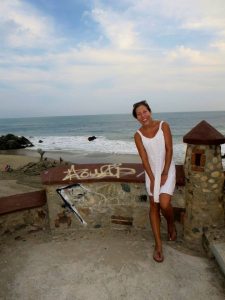We love hearing from CFHI Almuni about how their global health immersion experience impacted them as health providers. This month we’re sharing the reflections of Magdalene Kuznia. Maggie participated in the Tropical Medicine & Community-Based Care on the Coast of Mexico program in Puerto Escondido. She’s currently a clinical nurse at Stanford University, and a graduate of the University of Michigan School of Nursing.
As a nursing student I had the opportunity to travel to Puerto Escondido with CFHI. I was looking to broaden my nursing education experience. Faculty at my school recommended that I spend a summer working with CFHI so that I can better understand community health in nursing and improve my Spanish. The other CFHI scholars on my program were two physician-assistant students, and one student applying to medical school. It was fun for me to work with other pre-health students, especially ones that were going into different fields in medicine. We each had varying levels of Spanish and knowledge of medicine, so we were all able to learn from each other.
The first fe w weeks we rotated at different primary care clinics or “Centros de Salud.” I was in a nearby clinic that usually had two doctors and two nurses. The nurses would triage the patients, and then the doctor would see about 10 to 20 patients for about 20 to 30 minutes. The nurses there had autonomy to decide which patients saw the doctor that day, which streamlined the process for the doctor. I loved watching how the healthcare providers interacted with their patients. Appointment time was crucial, since most patients only came in to see the doctor when something was wrong. The doctor had minimal time to provide teaching on the ailment and healthier lifestyle practices. The nurses were able to compliment the doctors sick-care with wellness counseling.
w weeks we rotated at different primary care clinics or “Centros de Salud.” I was in a nearby clinic that usually had two doctors and two nurses. The nurses would triage the patients, and then the doctor would see about 10 to 20 patients for about 20 to 30 minutes. The nurses there had autonomy to decide which patients saw the doctor that day, which streamlined the process for the doctor. I loved watching how the healthcare providers interacted with their patients. Appointment time was crucial, since most patients only came in to see the doctor when something was wrong. The doctor had minimal time to provide teaching on the ailment and healthier lifestyle practices. The nurses were able to compliment the doctors sick-care with wellness counseling.
My last few weeks my colleagues and I were together in the hospital. I think some of my favorite experiences were in the labor and delivery unit. The people of Puerto Escondido do not celebrate birth in the hospital like Americans do – the unit had about 10 beds all in one line with each other. The nurses’ station faced the beds, and the doctor would come by and assess down the line which patient was ready to give birth next. There were no men allowed, and the only private room was where the patient was transported to for the actual labor part. The mother hoisted herself on the delivery table, and hoisted herself off when the baby arrived. None of the healthcare workers celebrated outwardly when a baby was born; the mother later received her baby and went on with her day. However, one man was so excited to have his first child, he snuck on to the unit to visit his wife and baby. The new parents were so excited and burst into tears of joy. The nurses allowed them to have their time together and then promptly shooed the man away to give the other patients their privacy. Their touch of excitement broke up the hustle and bustle of the day.
In nursing school, we discussed often the importance communicating on the same level as our patients. While we are educated in medical terminology, many people are not. As nurses, it is our focus to translate the medical language and apply it to our patients’ world. Puerto made this layer an important challenge for me. My Spanish skills were put to the test as I did my best to understand the common language of the people and the medical language of the health care practitioners. My Spanish going into the trip was purely conversational at best. My first weeks in Puerto I was able to physically see the affects of the disease or trauma on the patient, but later I became much better at listening to how the ailment affected the patient personally. CFHI offered us medical Spanish classes in the afternoons, which helped us piece together some of the issues we saw in the clinic or hospital earlier that day. I definitely saw an improvement in my Spanish-speaking skills by the end of the trip.
To this day, I still dream of the food that I ate and the beaches I ventured. Additionally, my time in Puerto ensured how I much loved taking care of different populations. It was a challenge taking care of people with a different language than myself. As a nurse today, I am constantly humbled by what I have to learn from others, and I am so happy my time in Puerto helped open me up to what the world can teach us.
